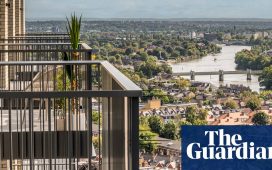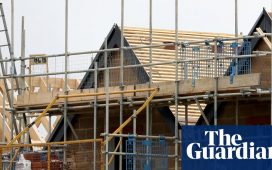Investment in UK commercial real estate picked up in the first quarter after hitting a record low at the end of last year, but dealmaking was still half its 10-year average as central London property struggles with falling values for office space and the rising cost of debt.
Investors struck deals worth £6bn for UK offices, retail and industrial property in the first quarter according to real estate data provider CoStar. Deals for central London offices, typically a key driver of investment volume, were also depressed.
The slow pace of dealmaking is one symptom of global anxiety over commercial real estate values, which have been hammered by fast-rising interest rates and uncertainty among investors over where prices for property will settle.
However the preliminary data, which excludes certain categories of property investment, showed the volume of transactions picked up by 24 per cent from a record low at the end of last year, when the mini-Budget rocked the property sector, fuelling hope that dealmaking activity is starting to recover.
“We are starting to witness a greater degree of pragmatism around pricing from vendors, especially those with equity calls or refinancing events on the horizon, which will also support investment activity moving forwards,” said Ed Bradley, head of London capital markets at CBRE.
The start of the year saw just a handful of large deals above £100mn, including the sale of Deutsche Bank’s office Winchester House to Malaysian investors earlier this week and BlackStone’s agreement to sell St Katharine Docks to a Singaporean group.
Asian investors accounted for three-quarters of buyers by volume in London and backed all of the large deals in the quarter, CBRE said. “Following a sharp repricing of office values in the fourth quarter of 2022, we are once again seeing significant interest from Asian investors,” said Bradley.
Large deals primarily came from all-cash buyers, including international investors taking advantage of the relative strength of the dollar over the pound, at a time when it is more difficult to secure debt for real estate transactions.
“Assets are now looking comparatively cheaper for overseas capital than they have done in recent years,” said Martin Lay, head of London capital markets at Cushman & Wakefield.
However, analysts warned that fears about the banking sector could slow the rebound. “The chances of a recovery in the coming months may have been dented by the recent turbulence in the banking sector, which has shaken investor confidence and tightened credit conditions further,” said Robert Stassen, CoStar’s head of analytics for Europe.
Sellers, including some funds that need to sell buildings to meet redemptions, are having to work harder to shift buildings. Winchester House on London Wall was sold by Invesco for £257mn, around £18mn less than the price sought in June last year. The buyers, Malaysia’s Gamuda and UK-based Castleforge, also secured a “favourable payment schedule”, putting down just £20mn upfront, Gamuda said in a stock market filing.
“Many deals last year collapsed because with the pricing change comes a disconnect between the seller and the buyer,” said one London office agent.
Property investors are closely following major transitions for evidence of the true price of buildings as interest rates rise. “It’s all a confidence game. Until we get more deals to happen, people will sit on the sidelines,” the agent said.











